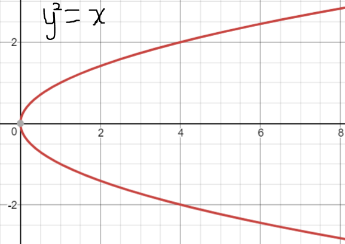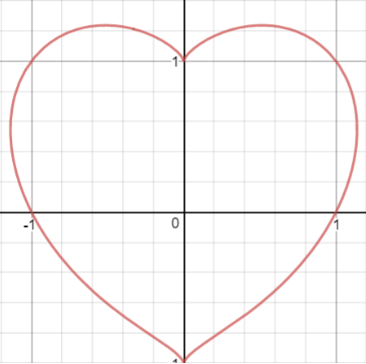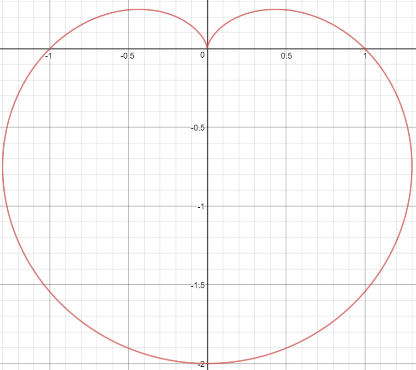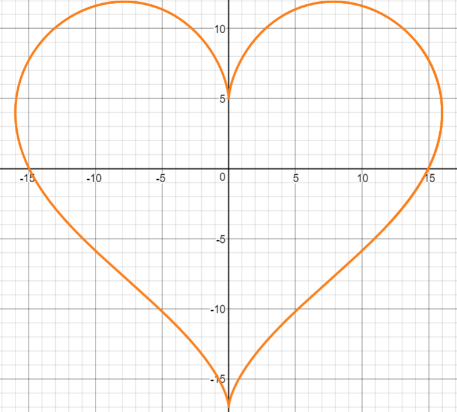Valentine's Day is a time for happiness and a time for being with loved ones. Or maybe not. From New Year's Day to Valentine's Day, people think about breaking up more than any other time of the year [1]. So, although it's Valentine’s Day, there may be a little bit of sadness brewing. However, fear not! The Valentines that we will be making are useful to both those with and without love in their life. If you have a special someone in your life, then you will be able to give them a PERFECT Valentine made with MATH. If you are without a special someone, come with me. We will numb our brains on something better than alcohol. You know I’m talking about Calculus. And who knows? Maybe this will help you hook up with a math minded individual.
Alright, so what is the most important aspect of the Valentine? Is it the message? Is it the card itself? Is it the chocolate and/or flowers that goes with it? Absolutely not! It is the heart drawing. Every Valentine needs a heart and if you can draw the PERFECT heart then you will have the PERFECT Valentine.
How can we draw the perfect heart? With online graphing tools. Duh. I recommend using Desmos.
If you have taken any algebra courses, you may be wondering how graphing a heart is even possible. After all, if you were to put a heart on graph paper you would notice that it does not pass the vertical line test. However, failing the vertical line test ONLY proves that the tested equation does not have y as a function of x. This means we can graph just about anything using the correct perimeters. For example, y^2 = x does not pass the vertical line test, but it is easily graphed by plugging in points.
Alright, let us begin!
Equation 1:
Alright, let’s start this off with something relatively easy. This equation is a good start. At its core, it is just a variation of an equation for a circle (x^2+y^2=1). This equation is also in simple y/x (Cartesian) coordinates so there isn’t too much going on. However, this graph proves less is more. The easy format makes it easy to plot, and you could graph it at home right now if you really wanted to. I would rate this equation as 8 hearts out of 10.
Equation 2:
This equation is for a cardioid named after, you guessed it, its heart-like shape. The cardioid appears in calculus quite often and any mathematician is sure to recognize it. However, the cardioid is in polar coordinates making it more difficult to graph. Polar coordinates are in terms of “theta” and “r.” If you are unfamiliar with polar coordinates, you may be wondering what “r” and “theta” represent. r^2 = x^2 + y^2 and theta is the angle of a right triangle if x and y were sides.

Source
I know it’s confusing, but that’s why its calculus. (Is your mind going numb yet?) Unfortunately, the cardioid is a little ugly compared to its competitor. It could barely pass as a heart. With all this in mind, I give the cardioid 5 hearts out of 10.
Equation 3:
x=16(sin(t))^3, y=13cos(t)-5cos(2t)-2cos(3t)-cos(4t)
So, this last one is a little bit more complex for sure. You may have noticed that this equation is in terms of “t.” That is because it is in parametric coordinates. Graphing this is probably easier than what you may be thinking. Pick any value for “t” and plug it in. Solve for the y/x values. Then, use the solved values to graph.
The equation just looks worse than it actually is. In reality, the equation given is really just another manipulation of a circle. The parametric equation for a circle is sin(t) = x, cos(t) = y. This is obviously a lot messier, but look at that perfect heart. It is voluptuous and curvy. Indeed, this heart is something special. I give it 10 hearts out of 10 and I think it is the perfect heart for which we are all looking.
Now that we have several candidates, its time to make a Valentine. Get out any kind of paper (preferable graphing paper) and write your favorite equation and graph it. Your done! You just created the perfect Valentine. Anything else, like a meaningful message, would just get in the way. Trust in the heart and let it do its magic. I guarantee that you will become instantly more attractive and you will feel much more accomplished!
Obviously, I have not listed every equation that yields a heart when graphed. There might be some easier ones and I am sure that there are harder ones. Also, by using the z-axis it is possible to make a 3-Dimensional heart… but let’s not do that today (maybe next year). Also, all of the graphs are pretty fun to play around with. Sometimes little changes can dramatically change the shape. There are some interesting links below. Thanks for reading and Happy Valentine’s Day.
I made most of the photos with Desmos, an awesome online graphing tool. Also, any comments or feedback is always appreciated.
Sources:
http://www.mathematische-basteleien.de/heart.htm
http://mathworld.wolfram.com/HeartCurve.html
https://www.desmos.com/calculator/ksjcpazwa9
http://abcnews.go.com/US/story?id=2863607&page=1








Congratulations @ulearn! You received a personal award!
Click here to view your Board
Congratulations @ulearn! You received a personal award!
You can view your badges on your Steem Board and compare to others on the Steem Ranking
Vote for @Steemitboard as a witness to get one more award and increased upvotes!